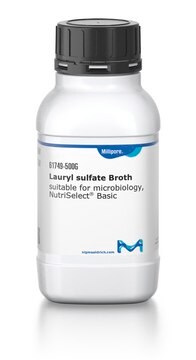1.09293
KOVACS′ indole reagent
for detecting microbial indole in the identification of indole-positive and indole-negative microorganisms, suitable for microbiology
Synonym(s):
4-(Dimethylamino)benzaldehyde solution, Indole reagent, Kovac′s reagent, Kovac′s reagent for indoles
About This Item
Recommended Products
Quality Level
form
liquid
packaging
pkg of 100 mL
technique(s)
microbe id | specific enzyme detection: suitable
color
yellow
pH
<1 (20 °C in H2O)
transition temp
flash point 36 °C
density
0.92 g/cm3 at 20 °C
application(s)
microbiology
storage temp.
2-8°C
suitability
Escherichia coli
enterovirulent E. coli (EEC) spp.
Related Categories
General description
Application
Storage and Stability
Analysis Note
Indole formation (Proteus vulgaris ATCC 8427): +
Indole formation (Enterobacter aerogenes ATCC 13048): -
Tested in DEV-Tryptophan broth art. no. 1.10694. (after incubation 24 hrs.; 35 °C aerobic).
Other Notes
Signal Word
Danger
Hazard Statements
Precautionary Statements
Hazard Classifications
Acute Tox. 4 Oral - Eye Dam. 1 - Flam. Liq. 3 - Met. Corr. 1 - Skin Corr. 1 - Skin Sens. 1
Storage Class Code
3 - Flammable liquids
WGK
WGK 1
Flash Point(F)
96.8 °F
Flash Point(C)
36 °C
Regulatory Listings
Regulatory Listings are mainly provided for chemical products. Only limited information can be provided here for non-chemical products. No entry means none of the components are listed. It is the user’s obligation to ensure the safe and legal use of the product.
EU REACH Annex XVII (Restriction List)
Certificates of Analysis (COA)
Search for Certificates of Analysis (COA) by entering the products Lot/Batch Number. Lot and Batch Numbers can be found on a product’s label following the words ‘Lot’ or ‘Batch’.
Already Own This Product?
Find documentation for the products that you have recently purchased in the Document Library.
Customers Also Viewed
Protocols
EN ISO 6579-1 standard specifies detection of Salmonella spp. in human consumption, animal feed, and environmental samples.
Our team of scientists has experience in all areas of research including Life Science, Material Science, Chemical Synthesis, Chromatography, Analytical and many others.
Contact Technical Service













